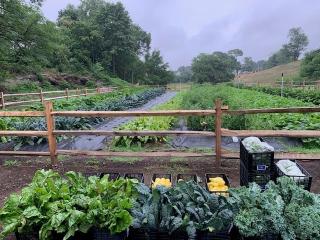Mack Park Farm & Food Forest Receives $45,000 Climate Resiliency Grant

The City of Salem is pleased to announce that the Mack Park Farm & Food Forest has received a $45,000 grant from the Metropolitan Area Planning Council’s Accelerating Climate Resiliency (ACR) Grant Program. This award will be used to construct a solar-powered storage building and water catchment system, which will be critical to accommodate planned food production increases and associated irrigation needs.
In addition to water conservation, the storage building will reduce transportation costs and increase efficiency by allowing food and supplies to be stored on site. The Mack Park Farm & Food Forest is in the process of rehabilitating an underused and overgrown area of a city park to create a vibrant recreational space where all residents will have the opportunity to enjoy the food forest, weekly farmers’ markets, and volunteer.
“I’m so grateful to the Metropolitan Area Planning Council for this grant to construct a solar-powered storage building and water catchment system for this municipal agriculture project,” says Mayor Kim Driscoll. “This green energy project will help us grow more green produce and save money while doing so. Thanks to all the volunteers and the staff team who work in tandem to grow and distribute fresh produce directly to those in need in our community. The Mack Park Farm is truly a success story and one more example of how our city has come together to support one another and make sure Salem works for everyone.”
The Mack Park Farm & Food Forest will partner with the Salem Pantry to distribute fresh produce directly to low-income neighborhoods, public housing sites (including senior housing) and public schools. This City project enhances resilience, particularly the physical stresses on the food system due to extreme temperatures, increasing intensity and frequency of flooding and drought, and subsequently the social stresses due to food shortage or insecurity facing vulnerable populations in the community. In addition, increasing food production at the farm will also help reduce dependence on long supply chains, therefore reducing the community’s carbon footprint while also strengthening local and sustainable production of food.

